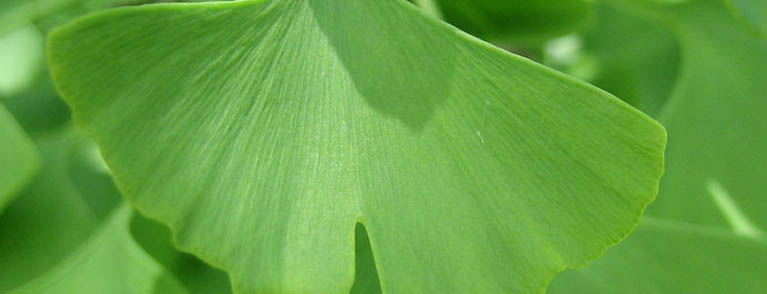As life expectancy increases, so does the number of people living with Alzheimer’s disease. A cure for this disease remains impossible, but several drugs have proven efficacy in the area of cognitive and non-cognitive impairment associated with Alzheimer’s disease – such as cholinesterase inhibitors, memantine, and the Ginkgo biloba extract EGb 761®. The latter has been investigated in several studies and recently showed additional cognitive benefit in combination with cholinesterase inhibitors.
Several studies give reason to believe that EGb 761® and cholinesterase inhibitors are equally effective in delaying symptom progression [1]. A randomized, double-blind exploratory study in 2009 [2] investigated this hypothesis and compared the treatment effects and tolerability of EGb 761® and donepezil, a second-generation cholinesterase inhibitor, in combination and as monotherapy. The main purpose was to provide a basis for further investigations and hypotheses.
Included were 96 outpatients aged 50 years or older who were
- met NINCDS/ADRDA criteria for probable Alzheimer’s disease (AD),
- in the TE4D-Cog test (screening test for dementia) a value of less than 36 and
- achieved a value of less than 6 in the clock-drawing test (CDT) and
- showed a score between 9 and 23 on the so-called Syndrome Short Test (SKT), a cross-culturally validated cognitive test battery, indicating mild to moderate dementia.
The number of over 90 patients, with approximately 30 patients in each treatment group, was considered large enough to draw initial conclusions and to stimulate further research.
The TE4D was preferred to the Mini-Mental Status Examination (MMSE) as a screening test because it can more sensitively and specifically differentiate between patients with dementia and healthy control participants. In addition, neuropsychiatric symptoms had to be present, as determined by a score of at least five on the 12-point Neuropsychiatric Inventory (NPI) scale.
Over a 22-week period, patients randomized into three blinded study groups received one of the following medications.
Group 1 (n=31): EGb 761® (240 mg/tgl.)
Group 2 (n=33): Donepezil (5 mg initially, then 10 mg/tgl after four weeks).
Group 3 (n=32): EGb 761® and donepezil combined at the same doses.
The dosage corresponded to the usual use of these substances. If therapy-associated side effects occurred with donepezil, the dosage could be reduced to 5 mg without interrupting blinding.
Results: Change from baseline to the end of 22 weeks and response rates were the same in all three treatment groups. This means that there was no significant clinical difference between donepezil, EGb 761® and the combination in any of the scales used to measure efficacy. Relevant improvements in cognitive functionality (defined as a decrease of at least four points in total SKT score) were observed in group 1 in 36, in group 2 in 38, and in group 3 in 45% (p>0.40 for all pairwise comparisons, two-sided chi-square test).
Progress in daily living skills (ADL, sub-score of the Gottfries-Bråne-Steen scale [GBS]) was found in 36% in group 1, 34% in group 2, and 39% in group 3 (p>0.70).
Global improvements (total GBS score) were seen in 68, 63, and 77% of patients in the respective groups (p>0.19).
The combination treatment showed relatively consistent, but not significant, superiority compared with either monotherapy. There was no difference between them in terms of efficacy, but there was a difference in terms of safety: the number of probably therapy-associated side effects was significantly lower with EGb 761® (p<0.01). Combination therapy also tended to have fewer side effects than donepezil monotherapy. The most common side effects were headache, insomnia, diarrhea, and fatigue.
Increased efficacy of the combination?
While the above-mentioned study initially only suggested that combined antidementive treatment with a Ginkgo biloba extract might provide clinical benefit, a cohort study [3] recently appeared demonstrating additional cognitive benefit. The data for this analysis came from the so-called ICTUS study, a multicenter prospective cohort study that aimed to investigate the clinical course, treatment effects, and socioeconomic impact of AD in Europe. The hypothesis that Ginkgo biloba extract would provide additional benefit as an adjunct to existing conventional first-line cholinesterase inhibitor therapy was tested using long-term changes in MMSE, Alzheimer’s Disease Assessment Scale-Cognitive (ADAS-Cog) subscale, and ADL scale. Values were collected at the time of baseline measurement, after six months and after one year. The analysis was based on the following two medication groups:
Group 1 (n=799): Patients receiving cholinesterase inhibitors only (donepezil, rivastigmine, and galantamine).
Group 2 (n=29): Patients receiving cholinesterase inhibitors plus a Ginkgo biloba extract (EGb 761®), the majority (56%) of them at a dose of 120 mg/tgl.
Patients on memantine and those who switched between therapies during the follow-up period were not considered for the present analysis. This allows a design as similar as possible to clinical trials (=two groups with different medication over a specified period of time).
Results: 828 patients were included in the current analysis. The changes in MMSE over 12 months in the second group were significantly different from those in group 1 (cholinesterase inhibitor monotherapy), i.e., the values under the combination were higher than under monotherapy. After six months, this difference was not yet visible. The ADAS-Cog scale showed a similar trend toward superiority of the combination, but it did not reach statistical significance. Nor could this be demonstrated in the ADL scale.
Discussion
The assumption that EGb 761® in combination with a cholinesterase inhibitor offers an additional benefit compared to monotherapy serves as a stimulus for further research. If the equivalence of the two classes of substances in terms of attenuation of symptom progression in mild to moderate AD has been demonstrated several times in placebo-controlled trials, the question of combination remains largely open. The two studies mentioned above attempt to fill this gap by laying a foundation for new hypotheses. This showed that Yancheva et al. [2] compared to monotherapy initially only a trend towards better efficacy. In Canevelli et al. [3], the benefit was also supported with statistical significance in an extremely important and frequently used outcome variable, namely the MMSE. This result is promising, especially with regard to the apparently better tolerability of the combination compared to monotherapy with cholinesterase inhibitors, but of course limitations remain: e.g. the sample size in the first study was very small, which does not allow clear conclusions. Nevertheless, it seems at least possible that two drugs with different routes of action could also achieve increased efficacy. In the second study, effective control was lacking because of the cohort nature, and the two groups differed significantly in important respects (education, ADAS-Cog) at baseline. Furthermore, the studies are not directly comparable because different instruments were used to survey cognitive health. Consequently, the results must first be verified in large-scale controlled clinical trials.
The fact that the benefit in Canevelli et al. [3] in the other two variables could also be related to the dosage, as it varied and was rather at the lower end of the usable dose amount with a majority of 120 mg EGb 761® (according to Swissmedic technical information: recommended dosage [4]: 120-240 mg/day).
Literature:
- Wettstein A: Cholinesterase inhibitors and Gingko extracts – are they comparable in the treatment of dementia? Comparison of published placebo-controlled efficacy studies of at least six months’ duration. Phytomedicine 2000 Jan; 6(6): 393-401.
- Yancheva S, et al: Ginkgo biloba extract EGb 761, donepezil or both combined in the treatment of Alzheimer’s disease with neuropsychiatric features: A randomised, double-blind, exploratory trial. Aging & Mental Health 2009; 13(2): 183-190.
- Canevelli M, et al: Effects of Gingko biloba supplementation in Alzheimer’s diseasepatients receiving cholinesterase inhibitors: Data from the ICTUS study. Phytomedicine (2014), http://dx.doi.org/10.1016/j.phymed.2014.01.003.
- Technical information Tebokan® at www.kompendium.ch.
HAUSARZT PRAXIS 2014; 9(7): 28-29











